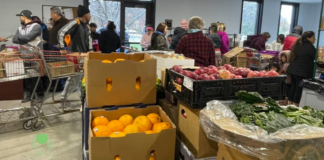By Dr. Kellye Knueppel
This post is sponsored by The Vision Therapy Center, which has offices in Brookfield, Fond du Lac, and Madison, Wisc.
 If your child struggles with spelling, don’t overlook the possibility that it could be related to a vision problem. A child who is a poor speller may have difficulty with certain vision skills needed to be a strong speller.
If your child struggles with spelling, don’t overlook the possibility that it could be related to a vision problem. A child who is a poor speller may have difficulty with certain vision skills needed to be a strong speller.
Closely related, a child may have a hard time spelling a word because they’re not able to visualize or “see” it written correctly in their mind.
Below, I’ll share a few common spelling errors associated with vision and visualization problems, and describe some key visual skills that are needed to be an effective speller. I’ll also provide information on what you should do next if you suspect your child has a vision problem.
Common Vision-Related Spelling Errors
At The Vision Therapy Center, my colleagues and I tend to see the following categories of spelling problems from the children we treat.
1. Letter reversals (backward letters)
If a child spells bat as dat, they’re exhibiting a letter reversal error. The most common letters to reverse are b and d. Other letters commonly reversed include p, q, and g.
Why do some children make these kinds of errors? People may confuse them with dyslexia, but the actual culprit is almost always a problem with what developmental optometrists call laterality and directionality.
Laterality is the ability to understand right- and left-sidedness of one’s own body. Directionality is a related skill important in understanding the sidedness of other people, of objects, and of space.
A child who has trouble with these skills may struggle with shapes that look similar but have a different meaning or significance depending on how they are oriented in space — such as alphabetic letters.
Consider the letters I specified above, like b and d, which are made up of a circle and a stick. The circle is on the right side for the letter b and the left side for the letter d.
Children who get these mixed up usually have difficulty understanding the concepts of right and left. This is a visual-perceptual problem and correcting it often needs to start with having the child first work on the general concepts of right and left.
2. Reversal of letter order
Spelling the word vision as visoin is an example of a reversal of letter order error, which can occur even when a person actually knows how to spell the word.
The tendency to make errors such as this usually goes away almost automatically when the visual problem is resolved. Possible causes for this type of error include problems with eye teaming and/or focusing.
In normal vision, eye teaming occurs when both eyes align to focus on the same point in space and work together in a precise and coordinated way.
Good eye teaming allows for normal depth perception, as well as vision that is comfortable, efficient, and single, as opposed to double. Imagine how difficult it would be for a youngster to spell if, for example, they experienced intermittent double vision.
Eye focusing encompasses the ability to see an object clearly and to shift focus between objects at different distances.
For instance, a child may have difficulty keeping reading material like a spelling list in focus and even experience the text as intermittently or constantly blurry. Or, a child may be able to see the words on a sheet of paper clearly but have difficulty shifting focus from the paper to the whiteboard and then back to the paper.
3. Poor spellers
We see two major groups of patients in this category. Group 1 comprises those who can study words for a spelling test and write them correctly for the test, but have great difficulty remembering them when completing a composition assignment, for example.
Group 2 includes children who make spelling mistakes no matter how much they study.
Neither of these groups can automatically be assumed to have a vision problem. However, to rule out a vision-related problem, a child’s vision skills as well as their visualization ability should be evaluated (see more on that further below).
Visualization is the ability to create and recall mental images. Spelling requires the ability to create a mental image of a word without being able to look at the word. That’s why visual recall is critical for spelling.
A child who has difficulty with visualization may have a hard time “seeing” a word spelled correctly in the mind. This type of problem can also cause difficulty in understanding number concepts and in creating visual pictures related to stories.
 What to Do If You Suspect There’s a Problem
What to Do If You Suspect There’s a Problem
The vision-related problems I’ve just described can be serious — especially if left untreated. But the good news is that they can often be helped with an individualized program of optometric vision therapy.
If you think your struggling speller may have a problem based on what you’ve just read, I strongly recommend you make a preliminary step and take The Vision Therapy Center’s free online Vision Quiz.
Depending on the results, you then may want to schedule a Functional Vision Exam, either at one of The Vision Therapy Center offices in the area or at a developmental optometrist’s office near you. (You can visit the College of Optometrists in Vision Development website for help finding one.)
Click here to take the Vision Quiz.
About the author: Dr. Kellye Knueppel is an award-winning developmental optometrist specializing in vision-related learning problems, sports vision, and rehabilitative optometry. She is board certified in vision development as a Fellow of the College of Optometrists in Vision Development. Since opening The Vision Therapy Center in 1995, she has dedicated herself to helping people overcome their visual problems.











